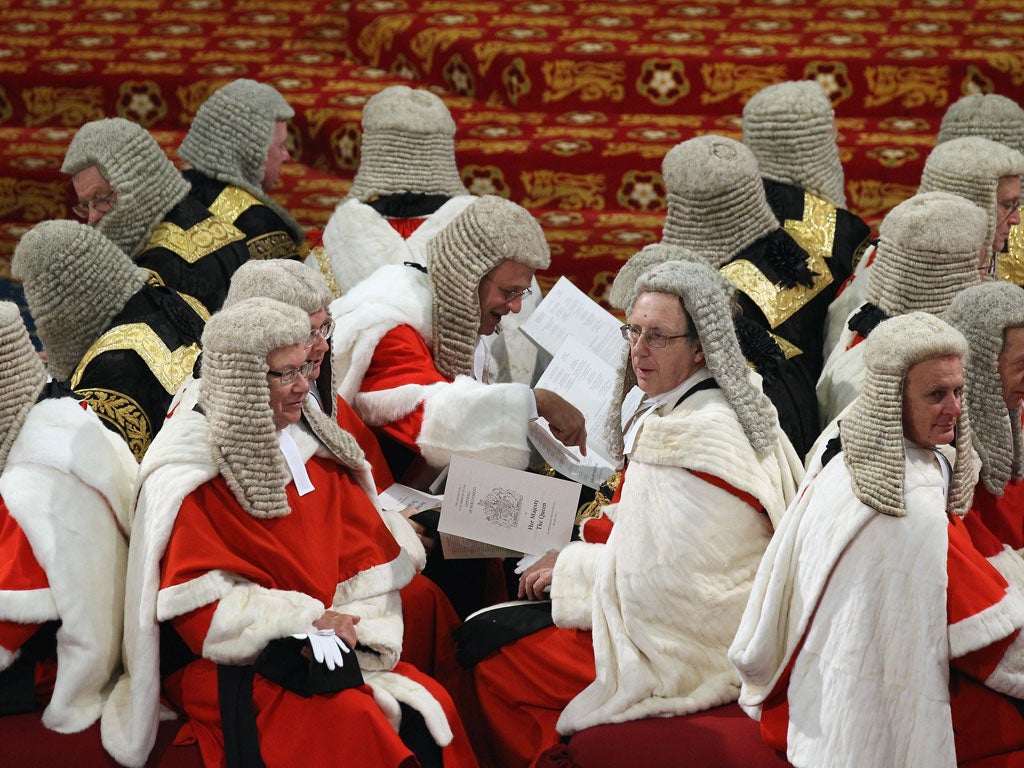The big questions: Was John Terry wronged? Do we need the Lords? And would you jail bankers?
Answered this week by Clive Stafford Smith


Your support helps us to tell the story
From reproductive rights to climate change to Big Tech, The Independent is on the ground when the story is developing. Whether it's investigating the financials of Elon Musk's pro-Trump PAC or producing our latest documentary, 'The A Word', which shines a light on the American women fighting for reproductive rights, we know how important it is to parse out the facts from the messaging.
At such a critical moment in US history, we need reporters on the ground. Your donation allows us to keep sending journalists to speak to both sides of the story.
The Independent is trusted by Americans across the entire political spectrum. And unlike many other quality news outlets, we choose not to lock Americans out of our reporting and analysis with paywalls. We believe quality journalism should be available to everyone, paid for by those who can afford it.
Your support makes all the difference.Would it serve any purpose to jail bankers found complicit in rate rigging?
If we are going to have criminal prosecutions at all, surely they should be related to the damage that the offender causes. By that yardstick, venal bankers who have caused misery for millions should face far greater punishment than those (primarily poor) people who commit offences that have far less impact. How can you be sent to prison for shoplifting but not for destroying the whole shop?
Do we need a Bill of Rights?
We have one. It is called the European Convention on Human Rights (ECHR). The problem with the ECHR is that it is not deemed binding on Britain in the way that a true bill of rights should be. The notion that the ECHR is some infringement of anyone's sovereignty is a myth. I was speaking with someone from Ukip who was unable to identify a single way in which the ECHR had harmed him at all; yet the ECHR has helped many people whose rights have been under threat.
Should the elderly be made to sell their homes to fund care bills?
The proper question is whether we should guarantee everyone proper care. We obviously should. Once we agree on that, perhaps we can agree on a 100 per cent death tax – people can give money away while they are alive, but why it should be passed on at death is beyond me.
Should UK citizens be sent to the US for trial on charges that would not be crimes here?
I would not extradite people to the US for anything. The US justice system is a nightmare no matter what the offence.
Was it right to prosecute John Terry for alleged racial abuse?
I cannot for the life of me see why Terry was prosecuted. I dislike racism intensely, but I also dislike it when David Cameron says that allowing prisoners the vote disgusts him more than anything. I suspect that Cameron has not met a lot of the people he apparently despises, and that reflects the same prejudices of the racist. But, either way, we should not prosecute these people; unless someone is advocating imminent physical harm to someone, the only answer to bad ideas has to be better ideas, not censorship and prosecution.
Do we need the House of Lords?
This needs a full essay! In short, no, we should not have the "House of Lords" (an anachronism) but we certainly need a second elected house (called a Senate) that checks the populist nonsense that comes out of Parliament. The fear of democracy reflected by the political opponents of change is rather pathetic, given that Westminster is labelled the mother of parliaments.
The farming minister doesn't know the price of a pint of milk. Does it matter?
I know Jim Paice (he is my mother's MP) and it is unfair to pick on him. The main problem with the British political system is that it conflates the Executive with the legislature. The theory of the US system is much more sensible, where the President appoints people to cabinet who are experienced in an area. In the Home Office, we have had a sequence of political hacks with little experience in the relevant field, and have therefore done a succession of very silly politically expedient things.
Do High Court judges (like the one in the Apple iPad case) need to know what's "cool"?
The problem with judges is more where they come from, than what they know. Our judges (particularly the higher up one goes) are from very similar academic backgrounds and have, in my view, far too little experience of the real world that afflicts the majority of citizens. That said, British judges are generally far better than American judges.
Should Russian oligarchs be allowed to settle their feuds in the UK courts?
Of course. It is the greatest flattery that others believe the British courts deliver justice that they cannot get at home.
Clive Stafford Smith is director of the charity Reprieve. He recently published 'Injustice' (Random House) about the US legal system, telling the story of Kris Maharaj, a British citizen sentenced to death in Florida.
Join our commenting forum
Join thought-provoking conversations, follow other Independent readers and see their replies
Comments